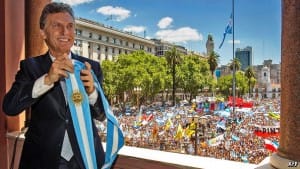
Argentina’s new president: A fast start
 Mauricio Macri’s early decisions are bringing benefits and making waves
Mauricio Macri’s early decisions are bringing benefits and making waves
MAURICIO MACRI, who took office as Argentina’s president in December, has wasted little time in undoing the populist policies of his predecessor. On December 14th he scrapped export taxes on agricultural products such as wheat, beef and corn and reduced them on soyabeans, the biggest export. Two days later Alfonso Prat-Gay, the new finance minister, lifted currency controls, allowing the peso to float freely. A team from the new government then met the mediator in a dispute with foreign bondholders in an attempt to end Argentina’s isolation from the international credit markets.
This flurry of decisions is the first step towards normalising an economy that had been skewed by the interventionist policies of ex-president Cristina Fernández de Kirchner and her late husband, Néstor Kirchner, who governed before her. They carry an immediate cost, which Mr Macri will seek to pin on the Kirchners. Some of the new president’s other early initiatives are proving more controversial.
The economic reforms seem to be working. Farmers who had hoarded grain in the hope that the tariffs would be lifted are now selling, replenishing foreign-exchange reserves that had been drained to defend the artificially strong peso. The newly freed currency fell by more than 30%, a further boost to exporters. It has stabilised at around 13 pesos to the dollar. “Substantive” talks with holdout bondholders starting in early January could lead to a return to credit markets in 2016.
But the devaluation has pushed up the inflation rate, already more than 25% when Mr Macri took office. To rein it back, on December 15th the central bank raised interest rates on short-term fixed deposits by eight percentage points to 38%. The government hopes to persuade business and trade-union leaders to keep tight control of prices and wages. But that may prove difficult: the unions are fragmented and little disposed to help Mr Macri, a centre-right politician; businesses may balk at holding down prices. Barclays, a bank, expects the economy to contract by 1.1% in 2016. But increased foreign investment should lead to renewed growth of 3.5% in 2017.
Mr Macri’s attempts to bring fresh talent into institutions dominated by Ms Fernández’s kirchneristas have run into resistance, from both foes and allies. On December 14th, with the Senate in recess, Mr Macri temporarily appointed by decree two Supreme Court judges. He then booted out the chief of the media regulator, Martín Sabbatella.
In both cases his motives were worthy. He wants independent jurists in the courts. Mr Sabbatella had clashed with Grupo Clarín, a big media group. Mr Macri thinks his removal will strengthen press freedom. But critics say he misused his authority. On the judges, at least, he has relented. He will now wait for the Senate’s approval.
Touring northern Argentina, where 20,000 people have been displaced from their homes by floods, Mr Macri blamed the former president, saying she had failed to invest in flood defences. For now, Argentines are likely to believe their new president. However, if the economic slowdown is prolonged, the honeymoon will not be.
